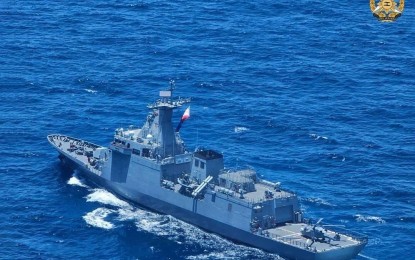
MARITIME COOPERATION. The missile frigate BRP Antonio Luna (FF-151) is one of the three Philippine Navy ships that participated in the April 7, 2024 multilateral maritime cooperative activity of the Philippines, the US, Japan, and Australia in the West Philippine Sea. The AFP on Wednesday (April 10, 2024) said the holding of future multilateral drills between Manila and its allies would depend on the approval of these nations’ respective governments. (Photo courtesy of the AFP)
MANILA – The conduct of future multilateral maritime drills between the Philippines and its allies will depend on the approval of the governments of these nations, the Armed Forces of the Philippines (AFP) said Wednesday.
“Conducting MMCA (multilateral maritime cooperative activity) with allied countries in the coming days is feasible, provided that all parties approve them at the ministerial level and in alignment with the international rules-based orders and international law,” AFP spokesperson Col. Francel Margareth Padilla said in a message to reporters.
Ministerial level refers to the approval of the defense establishments of the allied countries looking to participate in the MMCA.
Padilla said they are deferring to the Department of National Defense for additional details.
“We welcome more like-minded nations to join us in future MCAs,” she added.
Padilla said the recently concluded MMCA of the Philippines, the United States, Japan, and Australia in the West Philippine Sea was done within Manila’s exclusive economic zone (EEZ) and under International law and established norms in pursuit of the country’s national interests.
“These activities serve as a resolute statement of unity reaffirming our adherence to International laws. They embody the practical manifestation of our partnerships and collaboration with like-minded nations, showing our collective resolve to ensure stability and security in the region,” she said.
During the April 7 exercise, the Philippine Navy deployed the offshore patrol vessel BRP Gregorio Del Pilar (PS-15) with its AW-109 helicopter; missile frigate BRP Antonio Luna (FF-151) with its attached AW-159 Wildcat anti-submarine helicopter; and patrol ship BRP Valentin Diaz (PS-177).
Meanwhile, the US Navy participated with its littoral combat ship, USS Mobile, and a P-8A Poseidon aircraft, along with the Royal Australian Navy’s guided missile frigate HMAS Warramunga and a Royal Australian Air Force P-8A Poseidon maritime patrol aircraft; and Japan Maritime Self-Defense Force’s destroyer JS Akebono.
Two of China’s People’s Liberation Army Navy vessels were spotted off a distance but these ships did not bother the participants of the MMCA.
